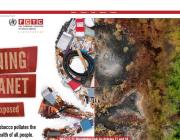
Sítio eletrônico do Knowledge Hub.
KNOWLEDGE HUB [página eletrônica]. Cetab/Ensp/Fiocruz, Rio de Janeiro, [s.l.], 2023. Disponível em: https://extranet.who.int/fctcapps/fctcapps/fctc/kh/alternativelivelihoods. Acesso em: 4 set. 2023.
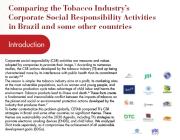
Corporate social responsibility actions (CSR) are measures and values adopted by companies to enhance their image in society. According to numerous studies, when developed by the tobacco industry (IT), these actions end up being characterized more by their interference in public health than by their commitment to society.
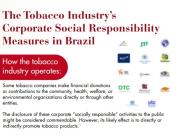
Some tobacco companies make financial donations or contributions to the community, health, welfare, or environmental organizations directly or through other entities. The disclosure of these corporate “socially responsible” activities to the public might be considered commendable. However, its likely effect is to directly or indirectly promote tobacco products.
What do you get when you call for creators around the world to stand up to Big Tobacco? More than 800 videos and social media graphics calling out the industry for the harms it causes, from creators across 43 countries.
It was all part of this year’s Global Media Competition, an annual contest organized by the Global Center for Good Governance in Tobacco Control, a partner in STOP. The competition gives creators the chance to spark positive change by raising awareness of the tobacco industry’s duplicitous business practices.
SEE This Year’s Winning Global Media Competition Entries. STOP, [s.l], 31 ago 2022. Disponível em: https://exposetobacco.org/news/2022-gmc-winners/?utm_source=mc&utm_mediu.... Acesso em: 10 jul 2024.
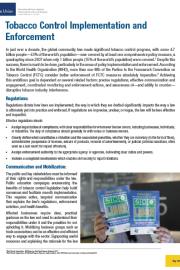
In just over a decade, the global community has made significant tobacco control progress, with some 4.7 billion people—63% of the world’s population—now covered by at least one comprehensive policy measure, a quadrupling since 2007 when only 1 billion people (15% of the world’s population) were covered.1 Despite this success, there is much to be done, particularly in the areas of policy implementation and enforcement. According to the World Health Organization (WHO), more than one-fifth of the Parties to the Framework Convention on Tobacco Control (FCTC) consider better enforcement of FCTC measures absolutely imperative.2 Achieving this ambitious goal is dependent on several related factors: precise regulations, effective communication and engagement, coordinated monitoring and enforcement actions, and awareness of—and ability to counter— disruptive tobacco industry interference.
TOBACCO Control Implementation and Enforcement. The Union, [s.l.], May, 2022. 4p.

Em pouco mais de uma década, a comunidade global fez progressos significativos no controle do tabaco, com cerca de 4,7 bilhões de pessoas – 63% da população mundial – agora cobertas por pelo menos uma medida política abrangente, um quadruplicando desde 2007, quando apenas 1 bilhão de pessoas (15% da população mundial) estavam cobertas.1 Apesar disso, sucesso, há muito a ser feito, particularmente nas áreas de implementação e aplicação de políticas. De acordo com à Organização Mundial da Saúde (OMS), mais de um quinto das Partes da Convenção-Quadro sobre O Controle do Tabaco (FCTC) considera absolutamente imperativa uma melhor aplicação das medidas da FCTC.2 Alcançar este objetivo ambicioso depende de vários fatores relacionados: regulamentos precisos, comunicação eficaz e engajamento, monitoramento coordenado e ações de fiscalização, e conscientização – e capacidade de combater – interferência disruptiva da indústria do tabaco.
TOBACCO Control Implementation and Enforcement. The Union, [s.l.], May, 2022. 4p.
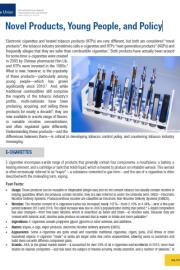
Electronic cigarettes and heated tobacco products (HTPs) are very different, but both are considered “novel products”; the tobacco industry sometimes calls e-cigarettes and HTPs “next generation products” (NGPs) and frequently alleges that they are safer than combustible cigarettes.1 Both products have actually been around for some time: e-cigarettes were created in 2003 by Chinese pharmacist Hon Lik, and HTPs were invented in the 1980s...
NOVEL Products, Young People, and Policy. The Union, [s.l.], May, 2022. 5p.

Cigarros eletrônicos e produtos de tabaco aquecido (HTPs) são muito diferentes, mas ambos são considerados “produtos novos”; a indústria do tabaco às vezes chama os cigarros eletrônicos e os HTPs de “produtos de próxima geração” (NGPs) e frequentemente alega que eles são mais seguros do que os cigarros combustíveis.1 Ambos os produtos existem há algum tempo: os cigarros eletrônicos foram criados em 2003 pelo farmacêutico chinês Hon Lik, e os HTPs foram inventados na década de 1980...
NOVEL Products, Young People, and Policy. The Union, [s.l.], May, 2022. 5p.
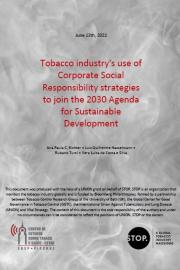
This document consists of an analysis of publications on Agenda 2030 and IT CSR actions available for academic research (abstract, report, file, scientific article, review, monograph, etc.), available in traditional media (radio, television, newspapers, pamphlets , etc) and available on digital media (social networks, blogs, YouTube channels, e-mail, among others), in the period between 2012 and 2021. For the search, the following descriptors were used: (SDG) OR (ODS) OR (Agenda for sustainable development) OR (2030 Agenda) OR (Sustainable Development Goals) OR (Agenda for Sustainable Development) OR (sustainable development) AND (tobacco industry) OR (tobacco industry)) AND (corporate social responsibility) OR (social corporate responsibility) AND (Brazil) OR (Brazil).
RICHTER, Ana Paula; HASSELMANN, Luis Guilherme Hasselmann; TORRES, Raquel; TURCI, Silvana Rubano; SILVA, Vera Luiza da Costa e. Uso pela indústria do tabaco de estratégias de Responsabilidade Social Corporativa para se associar à Agenda 2030 para o Desenvolvimento Sustentável [projeto STOP]. Centro de Estudos sobre Tabaco e Saúde (Cetab), Rio de Janeiro, 13 jun. 2022. 44p.